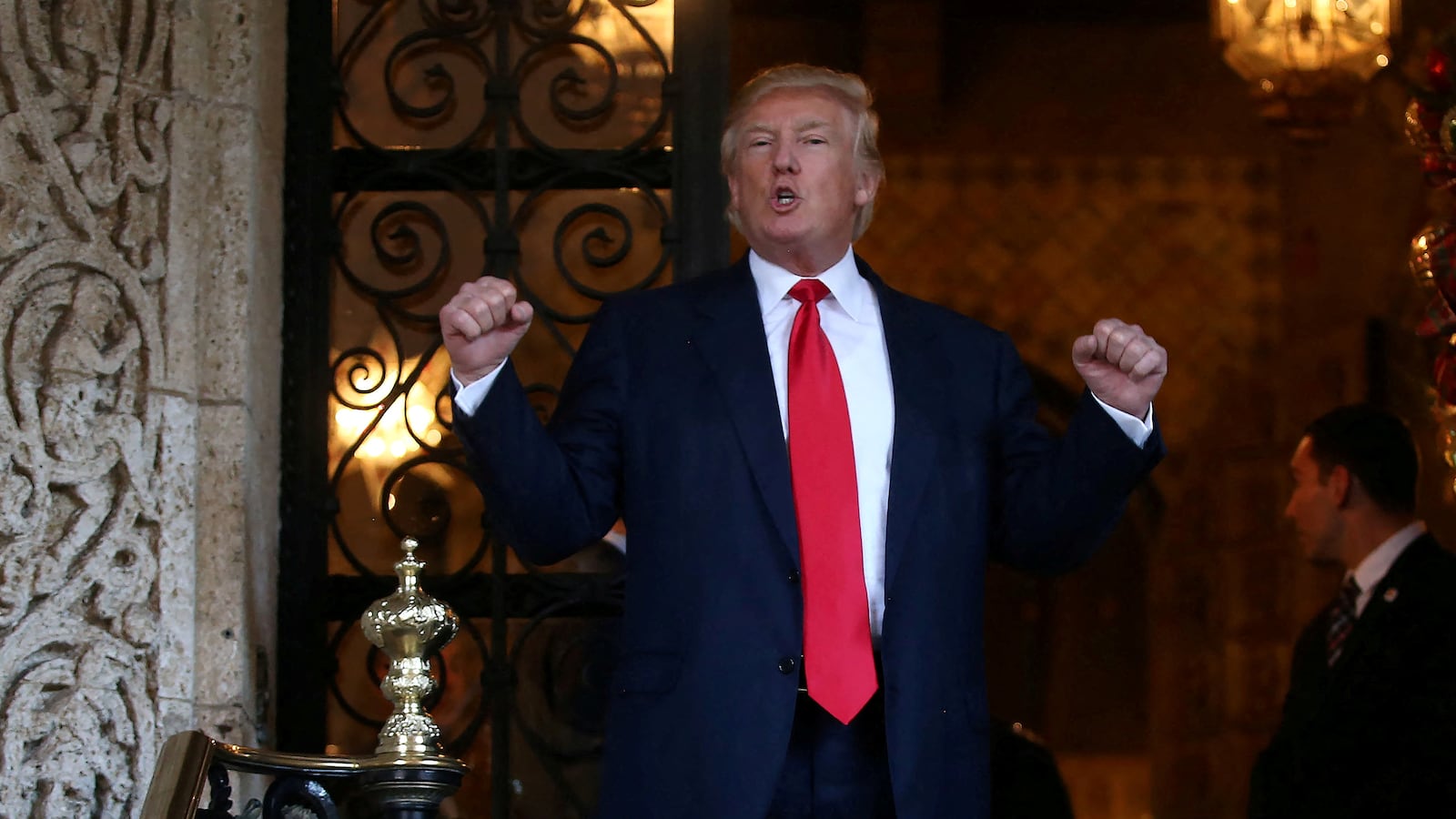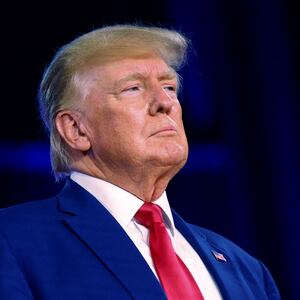Former President Donald Trump is under investigation for several violations of the Espionage Act and illegally keeping "top secret" government documents when he left the White House last year, according to court documents unsealed Friday afternoon.
And the FBI was spurred to move so aggressively and search the former president's Mar-a-Lago oceanside estate in Florida because some of the documents they were seeking pertained to the nation's nuclear weapons, according to The Washington Post.
The FBI search warrant lists three federal statutes to justify the search at the Palm Beach mansion: 18 U.S.C. § 793, 2071, and 1519. That means the Justice Department—in a historic move—is investigating the former president for violating the Espionage Act, mishandling federal records, and falsifying official documents to obstruct an investigation.
Together, they present the possibility that Trump may face significant jail time if he were convicted on the charges—and be barred from ever running for office ever again.
"They're investigating him for willfully gathering documents with the intent to cause harm... or that he saw [classified] markings on them and, knowing what they mean, failed to deliver them when the National Archives asked for them," said Jamil N. Jaffer, who founded the National Security Institute at George Mason University's law school.
Magistrate Judge Bruce E. Reinhart in West Palm Beach unsealed the records Friday afternoon, shortly after the Justice Department and Trump agreed that the records—which are normally kept private until criminal charges are filed—should be made public.
The seven-page search warrant and property receipt was signed FBI special agents and the Trump attorney present at the mansion during the search, Christina Bobb. In it, federal agents list what they grabbed when they searched the former president’s mansion: approximately 20 boxes including photo binders, handwritten notes, vaguely described information on the “President of France,” and a copy of the executive grant of clemency for Trump issued for his associate, GOP operative Roger Stone.
The Wall Street Journal and Fox News were the first to report that the FBI had seized 11 boxes of sensitive and “top secret” documents.
Trump's attorneys, Evan Corcoran and James Trusty, did not immediately respond to a request for comment.
Trump immediately countered that the documents were, from his point of view, no longer restricted.
"Number one, it was all declassified. Number two, they didn't need to 'seize' anything. They would have had it anytime they wanted without playing politics and breaking into Mar-a-Lago. It was in a secured storage, with an additional lock put on as per their request," Trump's account posted on his own social media network, Truth Social.
However, beyond the matter of classification is the notion that the former president somehow destroyed or altered records with the specific "intent intent to impede, obstruct, or influence" a federal investigation. Previous cases charged under § 1519 include David Kernell, the college student who hacked into Sarah Palin's email account when she was running for president in 2008 then tried to erase the digital evidence, and William Moyer, a police lieutenant in rural Pennsylvania who took part in covering up how racist high school students beat a Mexican immigrant to death.
The investigation is examining whether Trump unlawfully took highly sensitive documents from the White House and then failed to comply with requests from the National Archives and Records Administration (NARA) and Justice Department to return them voluntarily. Earlier this year, NARA found 15 boxes of missing presidential documents at Mar-a-Lago. Some of the files had been “torn up by former President Trump,” NARA said in a statement at the time, forcing officials to tape them back together.
As a result, NARA asked the Justice Department to look into whether Trump had potentially breached the Presidential Records Act, a Nixon-era law that forces departing presidents hand over all records when they leave office. (Ironically, Trump signed a law in 2018 that made breaches of the law a felony after Hillary Clinton’s email fiasco.)
On Friday morning, Trump denied a Washington Post report alleging that the feds carried out the search to locate classified documents about nuclear weapons, along with other items. He dismissed the report as a “hoax,” adding that those involved in the raid of his property were, in his view, “sleazy.”
Trump had also been critical of the search itself even while calling for the warrant to be unsealed. “Not only will I not oppose the release of documents related to the unAmerican, unwarranted, and unnecessary raid and break-in of my home in Palm Beach, Florida, Mar-a-Lago. I am going a step further by encouraging the immediate release of these documents,” he fumed in a post on Truth Social on Thursday night.
His screed came after Attorney General Merrick Garland announced that the Department of Justice would seek to unseal the warrant. Garland added that he had personally approved the operation after “less intrusive means” of retrieving the documents proved fruitless.
The highly unusual disclosure—warrants typically remain sealed during an investigation—comes after a week of right-wing rage, with hardline loyalists repeatedly pushing the idea that the search was an illegitimate, politically motivated attack launched by a tyrannical regime. Florida Gov. Ron DeSantis, a potential rival to Trump for the 2024 Republican presidential nomination, called the investigation a “weaponization of federal agencies.”
It was even a hill that at least one MAGA fan was literally willing to die on. Ricky Shiffer, a hard-boiled Trump stan who was enraged by the Mar-a-Lago search, was shot dead on Thursday after attempting an armed break-in at the FBI’s Cincinnati office. “Kill the F.B.I. on sight, and be ready to take down other active enemies of the people and those who try to prevent you from doing it,” an account using Shiffer’s name wrote on Truth Social on Tuesday.
The FBI raid was just the beginning of a torrid week for Trump’s legal team. Less than 48 hours later, Trump was hauled before a civil hearing with New York Attorney General Letitia James, whose office is investigating fraudulent practices in Trump’s business empire. The ex-president, who has previously criticized people who plead the Fifth, decided to do exactly that 440 times during the deposition.







